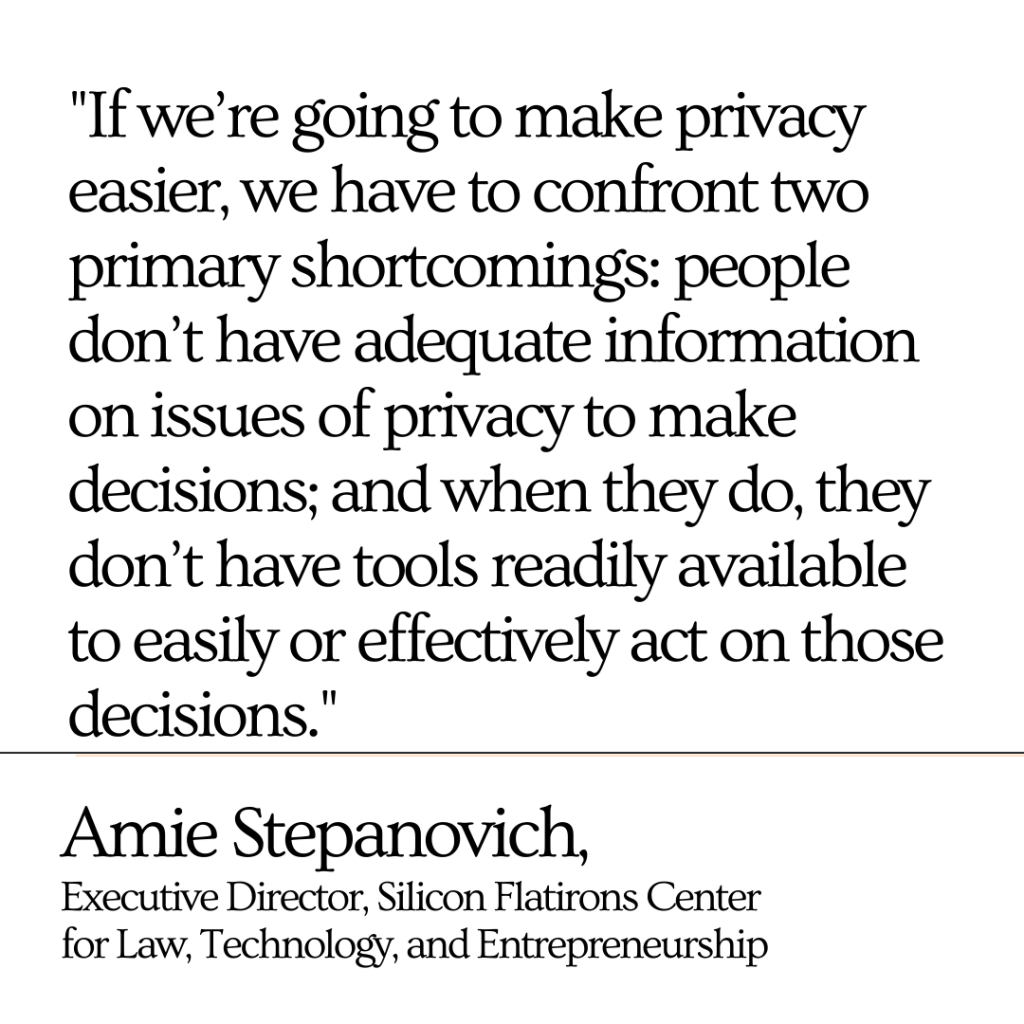By Amie Stepanovich, Executive Director, Silicon Flatirons Center for Law, Technology, and Entrepreneurship
Privacy is hard. A person may spend more than half of their day staring at a computer or smart device screen, wandering through an endless maze of social media, news, messaging, apps, and online stores. And that’s before you factor in the systems used to track you in the real world, like shopping and travel cards, as well as the “things” in the internet of things, which are ever expanding in number and scope, both in the home and around communities.
Every entity you cross will have a different way of collecting, processing, and further sharing your data, and a different set of controls for you to ostensibly limit that collection. There just aren’t enough hours in the day to read, understand, and take meaningful action across the ecosystem. What’s more, those “controls” are often just a binary option to either consent to tracking, or to not use the service; the latter an unviable choice for many who require access for some integral part of their lives.
Unfortunately, today few conversations about privacy are truly useful. Many choose to reference the experts through an abundance of jargon and “inside baseball.” Others attempt to find mass appeal by reducing arguments to either imminent catastrophe or tiresome hand-wringing. Few offer any immediate, practical advice or actions for people to take. This may be due to the fact that, at least in the United States, there is startlingly little that people can do to remedy the issue. 
If we’re going to make privacy easier, we have to confront two primary shortcomings: people don’t have adequate information on issues of privacy to make decisions; and when they do, they don’t have tools readily available to easily or effectively act on those decisions.
The first shortcoming is easy to identify a solution for, but that solution is not itself simple. In the digital age, we must make privacy education a priority, ensuring that it is a part of basic curricula across age groups. This likely should be part of an overall education campaign targeted at greater digital literacy that also includes how to access and process information encountered online and how the digital economy functions, on- and offline. The second problem is still more difficult. The U.S. has fallen behind globally on privacy and needs to re-double its efforts to codify meaningful privacy protections that prevent certain practices, provide greater control against others, and allow people to take advantage of the benefits of the internet without sacrificing their personal autonomy.
At Silicon Flatirons, we’re working to help make progress on both prongs. Through our Privacy Initiative we host panels, conferences, and other events that educate students and community members on how to think about and confront issues of privacy. These events also talk directly to and with law and policymakers to also better educate them on the equities involved in privacy regulation. We make it a point to avoid overly legalistic jargon without talking down to anyone, and we include experts from a broad diversity of backgrounds and positions, because conversations aren’t worth having unless they include a diverse range of stakeholders. We welcome everyone into these conversations and endeavor to provide space to explore the issues that matter.
We can’t achieve our mission in a vacuum. This is a call to action to those across the ecosystem to take heart and invest more openly in facilitating and supporting privacy education and meaningful regulatory protections. What we do now will provide the framework for how information is treated over the rest of the century, and we need to rise to the occasion.

